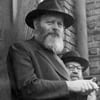On the 22nd of Shevat 1988, the Rebbe’s wife of sixty years, Rebbetzin Chaya Mushka Schneerson, passed away.1
Unlike her husband, Rebbetzin Chaya Mushka did not practice her dedication to the Jewish people in the public eye, but in the privacy of her own home. She never attended her husband’s public talks or communal services in the main synagogue. Even on Rosh Hashanah, the Rebbe blew the shofar for her at home, and she always referred to herself as Mrs. Schneerson, never as “Rebbetzin.”2
Before her husband accepted the leadership of Chabad-Lubavitch, she had not been so retiring. She attended community events and celebrations, and during the public talks of her increasingly frail father, Rabbi Yosef Yitzchak, she stood at the door to ensure the room did not become overcrowded.3 When her father passed away, and the future of the movement hung in the balance, she told her husband, “If you do not become rebbe, thirty years of my father’s life will have gone to waste.”4Rebbetzin Chaya Mushka did not practice her dedication to the Jewish people in the public eye, but in the privacy of her own home.
The strong stance that she took speaks volumes of her courageous commitment to Chabad’s continuity. Her older sister had long anticipated that her own husband, Rabbi Shmaryahu Gourary, would become the next rebbe. The Rebbetzin had no desire to compete with her sister, but along with the chassidim she understood that only an individual of her husband’s visionary stature could continue her father’s mission.5 The Rebbetzin’s sensitivity towards her sister seems to have been one of the factors that led her to evade any public occasion where she might be honored as the Rebbe’s wife.6
These tensions came to the fore in 1985, when it was discovered that the Gourarys’ son Barry was sneaking rare books from his grandfather’s library and selling them. When confronted, his mother claimed the books as family property, which her son had every right to sell for profit. Chabad’s central organization contested this claim, arguing that the books were the collective property of the Chabad community.7
Barry Gourary’s lawyers insisted on fighting the case in federal court, and served Rebbetzin Chaya Mushka with a deposition. When asked to whom she thought the books belonged, she replied, “I think they belonged to the chassidim, because my father belonged to the chassidim.” Labeled “the most dramatic moment in the whole proceeding” by Chabad’s lawyer, this remark poignantly expressed just how much the Rebbetzin gave up to ensure that chassidim would continue to have a rebbe.8
The Rebbetzin had no public profile, but did have a busy social life. She befriended many individuals, from within the Chabad community and from other backgrounds, entertaining them in her home, playing with their children, writing to them and conversing by telephone.9
In 1974, Israeli student Orah Jurawel visited New York and brought a gift for the Rebbetzin from a mutual friend. “When I arrived in New York, I called her and she immediately invited me to her home. . . . The Rebbetzin, a small, thin lady, was dressed very elegantly. She escorted me into the dining room, where the table was set with refreshments and beautiful tableware. She was very interested in what I was doing, what I was studying, what my aspirations were.”
The Rebbetzin was not simply being polite. “You could understand why they were husband and wife. And if the Rebbe had one admirer, one chassid in this world all those years, it was her.”This was the beginning of a lasting connection. When Jurawel’s fourth child was diagnosed with Down syndrome and heart complications, the Rebbetzin called to encourage her. “Everyone else asked about the child and the doctors, but the Rebbetzin always asked how I was feeling. . . . Her message was simply that I too am important . . .”10
Jurawel’s relationship with the Rebbetzin was certainly special, but those who knew the Rebbetzin testify that it typifies the intelligence, enthusiasm and concern that characterized all her interactions.11
By drawing a sharp line between her private persona and the public realm, the Rebbetzin was able to devote herself unreservedly to her husband. The Rebbe worked unthinkably long hours and never took a day off. But during the time he was at home, no one dared intrude. At whatever unearthly hour he arrived, the Rebbetzin was always awake to receive him.12 Visitors to her home often noted the piles of books, newspapers and journals that the Rebbetzin scoured for developments in science, global affairs and politics that the Rebbe might be interested in.13
Dr. Ira Weiss, the Rebbe’s cardiologist, spoke to the Rebbetzin almost daily to receive her report on the Rebbe’s health situation, and was one of the few people to interact with them in the privacy of their home. Weiss testified to the deep love, concern and respect that they each showed towards one another,14 and remarked that she was the one person in the world who the Rebbe could look to for honest critique:
“I was once at dinner with the Rebbetzin and the Rebbe. I had a chance to see them in action together, and it was a very good exchange, because the Rebbetzin was very smart. . . . Here was a personal conversation, the Rebbe and Rebbetzin talking to each other at the table and having a little bit of intellectual sparring. It was charming and revealing.”15
According to Rabbi Yehuda Krinsky, the Rebbe’s longtime secretary, the Rebbetzin’s unique relationship with her husband enabled her to appreciate his qualities in an entirely different way:
“You could understand why they were husband and wife. And if the Rebbe had one admirer, one chassid in this world all those years, it was her.”16







Join the Discussion